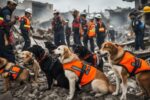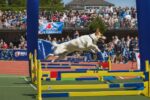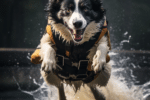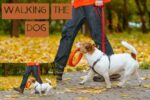Canine Socialization: Shaping Happy, Confident Dogs Together
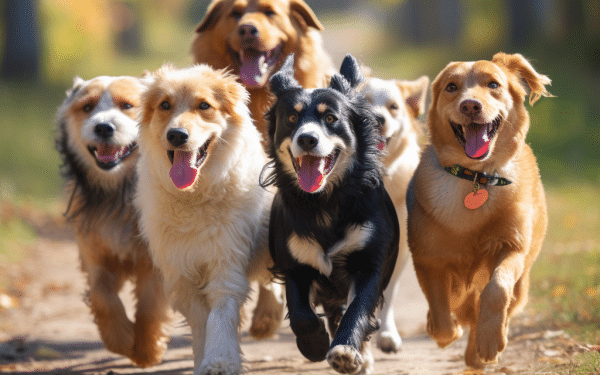
Canine socialization is a crucial aspect of raising a well-adjusted dog, and with the right guidance, you can ensure your furry friend grows up to be confident and happy. Just like with children, socializing dogs involves exposing them to various environments, people, and situations. It is recommended to start socializing puppies at a young age, between 3 and 14 weeks old, to shape their future temperament.
Puppy classes can be a helpful way to expose them to other dogs and people in a controlled setting. Socializing adult dogs is also possible, but it may require more patience and time. Regular exposure to different experiences and positive reinforcement can help adult dogs develop their social skills. Dog parks are great places for socialization and exercise, and it’s important to follow proper etiquette when visiting.
Using the right accessories, such as collars, leashes, and poop bags, can enhance the socialization experience for both dogs and owners. Overall, socialization plays a crucial role in raising a happy and well-adjusted dog.
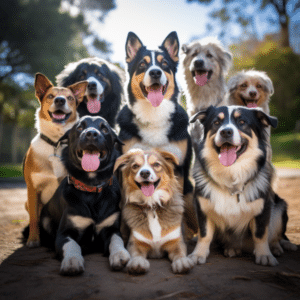
Why Is Canine Socialization Important?
Proper canine socialization is crucial for shaping your dog’s behavior and development. It helps them become well-adjusted family members, comfortable in various environments, and capable of positive interactions with people and animals.
Well-socialized dogs are less likely to exhibit fear or aggression, especially important for puppies in their critical developmental stage. Early socialization can prevent future behavior issues.
Socialization teaches dogs effective communication, boundaries, and coping skills, boosting their confidence and adaptability. Properly socialized dogs are generally happier, healthier, and more adaptable in social settings.
Why Is Canine Socialization Important?
“Socialization is the key to raising a well-adjusted dog. By exposing your dog to different people, animals, and environments, you are setting them up for success in the long run.”
To ensure successful socialization, it is important to start early in your dog’s life. The critical period for puppy socialization is between 3 and 14 weeks old, during which they are more open and receptive to new experiences. This is the time to introduce them to a wide range of people, animals, sounds, and environments in a positive and controlled manner.
| Benefits of Canine Socialization | Benefits of Canine Socialization |
|---|---|
| 1. Builds confidence and reduces fear | 2. Enhances communication and social skills |
| 3. Improves overall behavior and temperament | 4. Reduces the risk of developing aggression |
| 5. Helps prevent behavior problems | 6. Promotes mental stimulation and enrichment |
By enrolling your puppy in puppy socialization classes, you can provide them with opportunities for positive interactions with other puppies, as well as supervised guidance from experienced trainers. These classes can help build their confidence, teach basic obedience skills, and provide valuable socialization experiences in a controlled environment. It is important to choose reputable classes that prioritize positive reinforcement techniques and ensure the safety and well-being of all participants.
Remember that socialization is an ongoing process throughout your dog’s life. Regular exposure to different experiences, environments, and social interactions will help them continue to develop and refine their social skills. Keep in mind that each dog is unique, and it’s important to be patient, understanding, and consistent in your approach to socialization.
When Should You Start Socializing Your Dog?
The ideal time to start socializing your dog is during their critical developmental period, which occurs between 3 and 14 weeks of age. During this time, puppies are more open and receptive to new experiences, making it easier to shape their future behavior and temperament.
Early socialization is crucial for puppies as it helps them become familiar with different people, animals, and environments, reducing the likelihood of fear or aggression later in life. It is during this period that puppies are most adaptable and eager to explore the world around them.
One effective way to introduce your puppy to socialization is through puppy classes. These classes provide a controlled environment where puppies can interact with other dogs and people under the supervision of a trained professional. It allows them to learn essential social skills and build positive associations with new experiences.
| Benefits of Early Socialization: |
|---|
| 1. Improved social skills |
| 2. Reduced fear and aggression |
| 3. Increased adaptability to new situations |
| 4. Enhanced bond with owners |
However, it’s important to note that socializing adult dogs is also possible, albeit with more patience and time. Adult dogs may have missed out on early socialization opportunities, but they can still learn to socialize and adapt to new experiences. Consistent exposure to different environments, positive reinforcement, and gradual introductions to new people and animals can help adult dogs develop their social skills and build confidence.
Remember, socialization is a lifelong process. Even after the critical period has passed, it’s essential to continue exposing your dog to various experiences and environments. This ongoing socialization will help maintain their well-adjusted behavior and ensure they have a happy, social life.
The Benefits of Puppy Classes for Socialization
Puppy classes offer a structured environment where your furry friend can interact with other dogs and people, helping them develop important social skills and manners. These classes are specifically designed to provide a safe and controlled space for puppies to learn and grow.
One of the key benefits of puppy classes is the opportunity for your pup to socialize with other dogs. This interaction allows them to learn proper dog etiquette, such as how to greet, play, and communicate with their canine counterparts. Learning these skills at a young age can prevent future behavioral issues and improve their overall socialization with dogs of all sizes and breeds.
In addition to dog-to-dog socialization, puppy classes also expose your furry friend to various people. This exposure helps them become comfortable around new faces and different types of individuals, reducing the risk of fear or aggression towards strangers. It also teaches them how to behave politely around people, including how to approach and interact with unfamiliar individuals in a calm and controlled manner.
Puppy Classes
| Benefits of Puppy Classes for Socialization: | |
|---|---|
| 1. Opportunities for dog-to-dog socialization | – Improved dog etiquette and communication skills |
| 2. Exposure to different people | – Reduced fear and aggression towards strangers |
| 3. Structured learning environment | – Positive reinforcement and guidance |
Furthermore, puppy classes provide a structured learning environment for both you and your pup. Professional trainers guide you through various exercises and activities that promote positive reinforcement and appropriate behavior. They can offer personalized advice, answer your questions, and address any concerns you may have during the socialization process.
By enrolling your puppy in these classes, you are setting them up for success in the future. The early socialization they receive will help them become well-rounded, confident dogs who are comfortable and adaptable in different situations. Remember, a well-socialized dog is a happy dog!
Socializing Adult Dogs
While socializing adult dogs may require more time and effort, it is still possible to help them develop their social skills and become well-adjusted companions. Just like with puppies, adult dogs can benefit from positive social experiences and exposure to different environments. Here are some tips to help you socialize your adult dog:
- Start slow: Introduce your dog to new people and environments gradually. Begin with calm, controlled settings and gradually increase the level of stimulation.
- Use positive reinforcement: Reward your dog with treats, praise, and affection when they exhibit calm and appropriate behavior during social interactions.
- Seek professional help if necessary: If your dog displays fearful or aggressive behavior, it’s important to consult with a professional dog trainer or behaviorist. They can provide guidance and develop a customized socialization plan for your dog.
Introducing your dog to other dogs:
Socializing your adult dog with other dogs requires careful supervision and controlled introductions. Here are some steps to follow:
- Choose the right environment: Find a neutral territory, such as a park or a friend’s backyard, where both dogs can feel comfortable.
- Keep leashes loose: Allow the dogs to approach each other with loose leashes, giving them the freedom to interact naturally.
- Monitor body language: Watch for signs of tension, fear, or aggression in either dog. If any signs are present, separate them immediately.
- Provide positive experiences: Make the first few interactions short and positive, gradually increasing the duration to help the dogs build confidence and trust.
“Socializing adult dogs requires patience and understanding. Each dog has a unique history, and some may have had negative experiences in the past. By creating positive associations and providing consistent, gentle guidance, you can help your adult dog overcome their fears and develop healthy social skills.” – Dog Trainer
| Top Tips for Socializing Adult Dogs | Benefits of Socialization | Common Challenges |
|---|---|---|
| Start slow and gradually increase exposure | Improved behavior and communication | Fear and aggression |
| Use positive reinforcement | Confidence building and reduced anxiety | Limited socialization opportunities |
| Seek professional help if needed | Enhanced social skills and adaptability | Past traumas |
Remember, every dog is unique, and the socialization process may take time. Be patient and consistent in your efforts, and always prioritize your dog’s safety and well-being. With proper socialization, you can help your adult dog navigate the world with confidence and enjoy a fulfilling social life.
Regular Exposure to Different Experiences
Exposing your dog to diverse experiences is essential for their social development and well-being. This fosters confidence and resilience in dogs, just as it does in humans.
To expose your dog to new experiences, take them on daily walks in different areas. This introduces them to new sights, smells, and sounds, improving their adaptability and socialization skills as they interact with other dogs and people.
Additionally, introduce your dog to various situations like car rides, visits to pet-friendly stores, or outdoor cafes. This acclimates them to different stimuli and helps them learn appropriate behavior in various settings while keeping them on a leash for safety.
Socialization Checklist:
- Expose your dog to different environments, including parks, beaches, and urban areas.
- Introduce your dog to new people of all ages, genders, and ethnicities.
- Allow your dog to interact with other dogs in controlled settings to practice their social skills.
- Expose your dog to various sounds, such as traffic, loud noises, and fireworks, to desensitize them.
- Introduce your dog to different types of animals, such as cats or livestock, under supervised conditions.
By regularly exposing your dog to different experiences, you are providing them with the opportunity to develop important social skills and become a well-adjusted canine companion. Remember to always prioritize their safety and well-being by ensuring they are comfortable and confident in each new situation.
| Benefits of Exposing Your Dog to Different Experiences: |
|---|
| – Increased confidence and adaptability |
| – Improved socialization skills |
| – Reduced fear and anxiety in new environments |
| – Enhanced mental stimulation and enrichment |
Positive Reinforcement in Socialization
Using positive reinforcement, such as rewards and praise, during socialization can help your dog associate positive experiences with new situations, encouraging confident and well-adjusted behavior. When your dog is exposed to different environments, people, and other animals, rewarding them for calm and friendly behavior can reinforce positive associations.
One effective method of positive reinforcement is using treats. Offering small, tasty treats when your dog demonstrates desired behaviors, such as approaching new people or calmly interacting with other dogs, can help them feel more comfortable and confident in social situations. Over time, they will learn to associate these situations with positive outcomes.
It’s important to remember that each dog is unique, so finding the right rewards is essential. Some dogs may respond well to treats, while others may prefer praise or playtime. By observing your dog’s reactions and preferences, you can tailor your positive reinforcement approach to best suit their needs.
Examples of positive reinforcement:
- Giving treats when your dog approaches new people or friendly dogs
- Offering verbal praise and enthusiastic petting when they exhibit calm behavior in social settings
- Using playtime or their favorite toy as a reward for successful social interactions
Positive reinforcement not only helps your dog build confidence in social situations but also strengthens the bond between you and your furry companion. By pairing positive experiences with socialization, you can ensure your dog develops into a well-adjusted and happy member of your family.
| Benefits of Positive Reinforcement | Examples |
|---|---|
| Encourages confident behavior | “Good job!” |
| Strengthens the bond between you and your dog | Treats |
| Creates positive associations with new situations | Praise |
The Role of Dog Parks in Socialization
Dog parks foster dog socialization and exercise, enhancing their social skills and manners. For puppies and adult dogs, a visit to the dog park facilitates interaction with other dogs, promoting the development of vital social behaviors.
Dog parks offer a supervised environment for controlled play and socialization. Dogs can freely engage, learning proper social cues and etiquette by interacting with dogs of different breeds, sizes, and temperaments. This exposure helps dogs feel more confident and less likely to fear or act aggressively toward unfamiliar dogs.
Dog parks provide ample space for dogs to exercise and release energy. Regular exercise is crucial for a dog’s physical and mental well-being, and the open space in a dog park allows them to run, play, and chase freely. Physical activity also contributes to healthy social behaviors, making dogs more calm and relaxed during social interactions when their exercise needs are met.
Benefits of Dog Parks in Socialization
| Benefits of Dog Parks in Socialization |
|---|
| Opportunity for dogs to meet and interact with other dogs |
| Promotes healthy social behaviors and manners |
| Creates a controlled and supervised environment |
| Exposure to dogs of different breeds, sizes, and temperaments |
| Provides ample space for dogs to exercise and burn off energy |
| Supports physical and mental well-being |
When visiting a dog park, it’s important to follow proper etiquette. Always monitor your dog’s behavior and intervene if necessary to prevent any potential conflicts. Keep an eye out for any signs of stress or discomfort in your dog and be prepared to remove them from the situation if needed. Additionally, make sure your dog is up to date on vaccinations and has a reliable recall command to ensure their safety and the safety of others.
In conclusion, dog parks play a valuable role in canine socialization. They provide a safe and controlled environment for dogs to socialize and exercise, allowing them to develop important social skills and enjoy healthy interactions with other dogs. By incorporating regular visits to the dog park into your dog’s routine, you can contribute to their overall well-being and help them become a well-adjusted and socially confident canine companion.
Enhancing Socialization with the Right Accessories
Choosing the right accessories can make a significant difference in your dog’s socialization journey, ensuring safety and convenience during outings. When it comes to collars, opt for a durable and comfortable option that fits properly. A well-fitted collar will prevent your dog from slipping out and getting lost, while a comfortable one will not cause discomfort or restrict their movements.
Leashes are another essential accessory for socializing your dog. Consider using a leash that is long enough to allow them some freedom of movement, but still provides you with control. Retractable leashes can be a good option, as they can be adjusted to different lengths, giving your dog the freedom to explore while still keeping them close by when needed.
| Collars | Leashes | Poop Bags |
|---|---|---|
| Choose a durable and comfortable option | Consider a leash that is long enough for freedom of movement | Always carry poop bags for proper cleanup |
| Ensure a proper fit to prevent slipping out | Retractable leashes can provide flexibility | Dispose of waste responsibly and maintain cleanliness |
Don’t forget to carry poop bags during your socialization outings. Responsible pet ownership includes cleaning up after your dog, and having poop bags handy makes it easy to do so. It also helps maintain cleanliness in public spaces, ensuring a positive experience for everyone. Remember to dispose of the waste in designated bins.
By investing in the right accessories, such as collars, leashes, and poop bags, you can enhance your dog’s socialization experience. These items not only ensure your dog’s safety and convenience but also contribute to a positive environment for everyone involved. So, equip yourself with the right tools, and enjoy the journey of socializing your furry friend!
Canine Socialization Dos and Don’ts
When it comes to socializing your dog, there are certain dos and don’ts to keep in mind to ensure a positive and successful experience. By following these tips, you can help your dog develop strong social skills and become a well-adjusted pet.
Do:
- Start socializing your dog at a young age, between 3 and 14 weeks old. This critical period is when puppies are most receptive to new experiences and can shape their future temperament.
- Expose your dog to a variety of environments, people, and situations. This includes different locations, sounds, textures, and interactions with strangers, children, and other animals.
- Enroll your puppy in socialization classes. These classes provide a controlled environment where puppies can interact with other dogs and people, helping them develop important social skills.
- Use positive reinforcement techniques to reward your dog’s good behavior during socialization. Praising, treating, and using clicker training can help reinforce positive associations with new experiences.
Don’t:
- Force your dog into uncomfortable situations. It’s important to gradually introduce new experiences and allow your dog to approach at their own pace. Pushing them too far can lead to fear or anxiety.
- Expose your dog to aggressive or poorly behaved dogs. Choose socialization opportunities where you can ensure the safety and positive interactions for your dog.
- Overwhelm your dog with too many new experiences at once. Introduce new environments and stimuli gradually to prevent overwhelming your dog and causing stress.
- Ignore signs of fear or anxiety in your dog. If your dog shows signs of stress, such as trembling, excessive panting, or trying to escape, it’s important to remove them from the situation and reassess their comfort level.
By following these dos and don’ts, you can create a positive and successful socialization experience for your dog. Remember to be patient and consistent in your approach, and celebrate your dog’s progress along the way. With proper socialization, you can raise a happy and well-adjusted dog that is confident in various environments and social situations.
Overcoming Socialization Challenges
Socialization can sometimes be challenging, but with the right strategies and persistence, you can help your dog overcome any hurdles and become a well-adjusted individual. Each dog is unique, and some may require additional support during the socialization process. Here are some common challenges you may encounter and techniques to address them:
Fear or Anxiety:
If your dog displays fear or anxiety in certain situations, it’s important to address their emotions with patience and understanding. Gradual exposure, starting with low-intensity environments, can help them build confidence. Offer positive reinforcement, such as treats, praise, or toys, to create positive associations. Consult with a professional trainer or behaviorist for guidance on desensitization and counterconditioning techniques.
Aggression or Reactivity:
Dogs that exhibit aggression or reactivity towards other dogs or people require careful handling and management. Seek professional help from a certified dog trainer experienced in behavior modification. Controlled introductions, using muzzle training if necessary, can help your dog learn appropriate behaviors. Focus on rewarding calm and non-reactive behavior to promote positive associations.
Limited Exposure:
If your dog has had limited exposure to different environments, people, or animals, they may struggle with socialization. Gradually introduce them to new experiences, starting with low-stress situations, and gradually increase the difficulty. Use positive reinforcement and rewards to encourage their progress. Enrolling in obedience classes or hiring a trainer can provide structured socialization opportunities.
| Challenges | Techniques |
|---|---|
| Fear or Anxiety | Gradual exposure, positive reinforcement, professional guidance |
| Aggression or Reactivity | Controlled introductions, professional assistance, reward calm behavior |
| Limited Exposure | Gradual introduction, positive reinforcement, obedience classes |
Remember that every dog is an individual, and progress may take time. Be patient, consistent, and always put your dog’s welfare first. Celebrate even small victories and seek professional help when needed. With dedication and love, your dog can overcome socialization challenges and thrive as a well-adjusted companion.
The Lifelong Benefits of Canine Socialization
Early canine socialization yields a lifetime of benefits, fostering confidence, reducing anxiety, and improving behavior. Crucial during the first 3 to 14 weeks of life, socialization hones a dog’s temperament.
This process equips dogs with proper behavior and communication skills by introducing them to diverse environments and situations. It also plays a vital role in preventing issues like fear, aggression, and separation anxiety.
Well-socialized dogs form positive relationships with both humans and other animals, adapt easily to new experiences, and handle routine changes and travel stress-free.
Moreover, socialization mentally stimulates dogs, preventing boredom and promoting their overall well-being, making them self-assured, friendly, and responsive to training.
| Benefits of Canine Socialization: |
|---|
| Improved behavior |
| Increased confidence |
| Decreased anxiety |
| Positive interactions with other dogs and humans |
| Prevention of behavioral issues |
| Adaptability to new experiences and environments |
| Mental stimulation and reduced boredom |
| Self-assured and friendly behavior |
In conclusion, socialization plays a crucial role in raising a happy and well-adjusted dog. By investing time and effort into socializing your dog from a young age, you are setting them up for success throughout their lifetime. Whether it’s through puppy classes, regular exposure to different experiences, or positive reinforcement, socialization can greatly enhance your dog’s behavior, mental well-being, and overall quality of life.
Recognizing Signs of Successful Socialization
By understanding the signs of successful socialization, you can gauge your dog’s progress and ensure they are thriving in their social interactions. Here are some key indicators to look out for:
- Confidence and Curiosity: A well-socialized dog will display confidence when encountering new people, animals, and environments. They will show curiosity and eagerness to explore their surroundings without fear or aggression.
- Appropriate Play Behavior: Socialized dogs engage in friendly and playful interactions with other dogs. They understand how to initiate play and how to respond appropriately to cues from their playmates, avoiding rough or aggressive behavior.
- Positive Body Language: A socially adept dog exhibits relaxed body language and facial expressions. Their ears are forward, tail wagging (not tucked), and they make loose, wiggly movements. They make eye contact without staring and may even offer a relaxed open-mouthed or panting smile.
Successful Socialization
“A well-socialized dog will display confidence when encountering new people, animals, and environments.”
“A socially adept dog exhibits relaxed body language and facial expressions. Their ears are forward, tail wagging (not tucked), and they make loose, wiggly movements.”
Remember, every dog is unique, and their socialization journey may progress at different rates. If you notice any signs of fear, anxiety, or aggression during social interactions, it’s crucial to seek guidance from a professional trainer or behaviorist. They can provide tailored advice and support to help your dog become a well-adjusted member of society.
| Signs of Successful Socialization | Indicators |
|---|---|
| Confidence and Curiosity | A well-socialized dog will display confidence when encountering new people, animals, and environments. They will show curiosity and eagerness to explore their surroundings without fear or aggression. |
| Appropriate Play Behavior | Socialized dogs engage in friendly and playful interactions with other dogs. They understand how to initiate play and how to respond appropriately to cues from their playmates, avoiding rough or aggressive behavior. |
| Positive Body Language | A socially adept dog exhibits relaxed body language and facial expressions. Their ears are forward, tail wagging (not tucked), and they make loose, wiggly movements. They make eye contact without staring and may even offer a relaxed open-mouthed or panting smile. |
By recognizing these signs of successful socialization, you can ensure that your dog is on the right path towards becoming a well-adjusted, confident, and happy member of your family and community.
Continuing Socialization Throughout Your Dog’s Life
Continual socialization is vital for your dog’s lifelong well-being. Puppies or adults, both benefit from exposure to various situations and settings to stay well-adjusted and content.
Here are some key considerations for continuing your dog’s socialization:
- Introduce your dog to new experiences: Take your dog to new places, such as parks, beaches, or even pet-friendly stores. Exposing them to different sights, sounds, and smells helps them become comfortable in various environments.
- Encourage positive interactions with people and other dogs: Set up playdates with other well-behaved dogs to promote healthy socialization. Allow your dog to interact with different people of various ages, ensuring each interaction is positive and rewarding.
- Engage in training and obedience classes: Enrolling your dog in training and obedience classes not only helps reinforce basic commands but also provides opportunities for them to interact with other dogs in a structured setting.
- Continue reinforcing good behavior: Positive reinforcement is crucial in maintaining your dog’s well-adjusted behavior. Reward them with treats, praise, and affection when they exhibit desired social behaviors.
Quotes:
“Socialization is like a lifelong journey for your dog. By providing them with ongoing exposure to new experiences, you are helping them develop the necessary skills to navigate the world around them.” – Dog Behavior Expert
The Importance of Consistency:
Consistency is key when it comes to socializing your dog. Regularly exposing them to diverse situations and environments helps prevent regression and ensures that their social skills continue to grow. Remember, a well-socialized dog is more likely to feel confident, less anxious, and exhibit better behavior overall.
| Socialization Tips | Summary |
|---|---|
| Expose your dog to different environments, people, and situations | Helps them become comfortable and adaptable |
| Encourage positive interactions with other dogs and people | Promotes healthy social bonds |
| Enroll in training and obedience classes | Provides structured socialization opportunities |
| Use positive reinforcement to reward good behavior | Strengthens desired social behaviors |
By prioritizing ongoing socialization throughout your dog’s life, you are investing in their overall well-being and ensuring they lead a happy, balanced life. Remember to always approach socialization with patience, consistency, and positivity, and celebrate the progress your dog makes along the way.
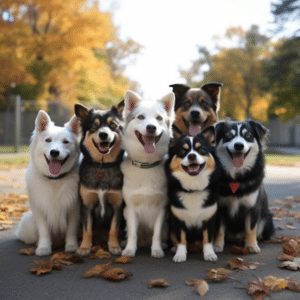
Conclusion
Canine socialization is a key factor in shaping your dog’s behavior and overall well-being, and by utilizing expert tips and techniques, you can provide them with the foundation for a lifetime of happiness and healthy social interactions.
Socializing your dog from a young age is crucial. Similar to children, dogs need exposure to a variety of environments, people, and situations to develop their social skills. It is recommended to start socializing puppies between 3 and 14 weeks old, as this is a critical period for shaping their future temperament.
Puppy classes can be an excellent way to introduce your furry friend to other dogs and people in a controlled setting. These classes provide valuable opportunities for social interaction and learning, helping puppies grow into well-adjusted and confident dogs.
Even if you have an adult dog, socialization is still possible. However, it may require more patience and time compared to puppies. Regular exposure to different experiences, positive reinforcement, and consistent training can help adult dogs develop their social skills and overcome any existing behavioral challenges.
Dog parks are fantastic places for socialization and exercise. When visiting, remember to follow proper etiquette and supervise your dog to ensure a safe and enjoyable experience for everyone. Additionally, using the right accessories, such as collars, leashes, and poop bags, can enhance the socialization process and create a positive environment for both you and your dog.
Overall, socialization plays a crucial role in raising a happy and well-adjusted dog. By providing your canine companion with the necessary social experiences and utilizing expert tips, you are setting them up for a lifetime of happiness, healthy social interactions, and a deep bond with you as their owner.
FAQ
Q: Why is canine socialization important?
A: Canine socialization is important because it helps shape a dog’s behavior, training, and overall well-being. It allows them to become familiar with different environments, people, and situations, leading to a more well-adjusted and happy dog.
Q: When should you start socializing your dog?
A: It is recommended to start socializing puppies between 3 and 14 weeks old. This early age is crucial for shaping their future temperament and increasing their chances of becoming well-socialized adult dogs. However, socializing adult dogs is also possible with patience and time.
Q: What are the benefits of puppy classes for socialization?
A: Puppy classes provide a controlled setting for your puppy to interact with other dogs and people, helping them develop important social skills. These classes also contribute to their overall social behavior and training, making them a valuable tool in the socialization process.
Q: How do you socialize adult dogs?
A: Socializing adult dogs may require more patience and time compared to puppies. It involves gradually exposing them to different experiences, environments, and people while using positive reinforcement. Consistency and patience are key to effectively socialize adult dogs.
Q: Why is regular exposure to different experiences important for socialization?
A: Regular exposure to different experiences helps broaden your dog’s socialization, build their confidence, and reduce fear or anxiety in new situations. It allows them to adapt to a variety of environments, people, and stimuli, leading to a more well-rounded and confident dog.
Q: How does positive reinforcement play a role in socialization?
A: Positive reinforcement, such as rewarding your dog with treats, praise, or play, helps reinforce positive behaviors during socialization. By rewarding your dog for calm and appropriate behavior in social situations, you encourage them to continue displaying desirable behavior, making socialization a positive and rewarding experience.
Q: What is the role of dog parks in socialization?
A: Dog parks can be great places for socialization and exercise. They provide an opportunity for your dog to interact with other dogs, helping them develop important social skills. However, it’s important to follow proper etiquette and supervision to ensure a safe and positive experience for everyone involved.
Q: How can the right accessories enhance socialization?
A: Using the right accessories, such as collars, leashes, and poop bags, can enhance the socialization experience for both dogs and owners. Properly fitted collars and leashes ensure control and safety, while having poop bags on hand promotes responsible dog ownership and keeps public areas clean.
Q: What are the dos and don’ts of canine socialization?
A: Some dos of canine socialization include starting early, exposing your dog to a variety of experiences, using positive reinforcement, and seeking professional guidance if needed. Some don’ts include forcing interactions, overwhelming your dog, or exposing them to potentially dangerous situations.
Q: How can you overcome socialization challenges?
A: Overcoming socialization challenges may require patience and a gradual approach. Break down challenging experiences into small, manageable steps, and use positive reinforcement to reward your dog’s progress. Seek professional help if needed, as they can provide guidance tailored to your specific challenges.
Q: What are the lifelong benefits of canine socialization?
A: Canine socialization has lifelong benefits for dogs. It positively impacts their behavior, mental well-being, and overall quality of life. Well-socialized dogs are generally more confident, adaptable, and better equipped to handle new experiences and environments throughout their lives.
Q: How can you recognize signs of successful socialization?
A: Signs of successful socialization in dogs include calm and relaxed behavior in social situations, appropriate play and interaction with other dogs, and confidence in new environments. These signs indicate that your dog is comfortable and well-adjusted in various social settings.
Q: How can you continue socialization throughout your dog’s life?
A: Socialization should be an ongoing process throughout your dog’s life. Regularly expose them to new experiences, environments, and people. Continue using positive reinforcement to reinforce positive behavior in social situations. By making socialization a part of their daily life, you can ensure your dog remains well-adjusted and social throughout their lifespan.

